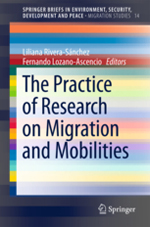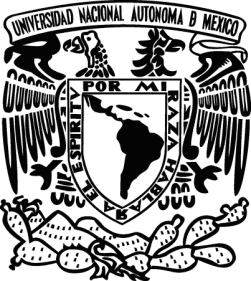|
|
| |
|
| |


SpringerBriefs in
Environment, Security, Development and Peace (ESDP)
A Peer-reviewed Book Series
Edited by
Hans Günter Brauch
Free University of Berlin and AFES-PRESS
| Vol 14 |
Liliana Rivera-Sánchez, Fernando Lozano-Ascencio (Eds.): The Practice of Research on Migration and Mobilities. SpringerBriefs in Environment, Security, Development and Peace, vol. 14 – Migration Studies Subseries No. 1 (Cham – Heidelberg – New York – Dordrecht – London: Springer-Verlag, 2014).
ISBN (Print): 978-3-319-02692-3
ISBN (Online/eBook): 978-3-319-02693-0
DOI:
More on this book
Order Form
Order this book on the Springer Website
Order electronic version and individual chapters |

|
| |
|
|
-
The book helps researchers and graduate students to reconsider and rephrase their research question(s)
-
Emphasizes the multidisciplinary or interdisciplinary character of migration and mobility studies
-
Helps readers to grasp the methodological experience of expert groups and researchers in the migration and mobilities field
The migration process is interpreted in a different way when researchers live in so-called societies of origin, than when it is interpreted from societies of destination—even when research work is multi-situated. The localization of researchers in this field involves numerous factors that influence the modalities for conducting research. Research agendas are clearly mediated by these localizations, and this book on the contemporary social sciences points out those mediations, breaking with the dichotomous readings that are implicit in this migration process (origin-destination, north-south, and cause-effect, to mention just a few). In the individual chapters, priority is given to presenting the modalities through which research is conducted in multidisciplinary or interdisciplinary teams on the American Continent. In summary, the focus of this book is on the narrative of methodological experience of the Practice of Research on Migration and Mobilities.
Content Level » Research
Keywords » Latin American Immigrants - Migration Studies - Practice of Research - Sociology of Migration and Mobilities
Related subjects » Population Studies - Social Sciences
Table of contents
Introduction: Interdisciplinary Dialogues and Methodological Debates.- Residential Settlement and Mobility in the San Quintin Valley: Methodological Reflections on an Interdisciplinary Study.- A Comparative Approach to Global Domestic Service in Two Cities: Methodological Notes.- Forced Migration of Colombians: A Relational Perspective.- Transnational Migration and the Reformulation of Analy¬tical Categories: Unpacking Latin American Refugee Dynamics in Toronto.- Between Contexts of Departure and Modalities of Social Organization of Migration: a Radiography of the Research Process
On the Editors
 |
Liliana Rivera-Sánchez is a sociologist. She received her Ph. D. in 2004 from the New School for Social Research, New York. Cur¬rently she is a researcher at the Regional Center of Multidisciplinary Research, at the National Autonomous University of Mexico (CRIM-UNAM). Her geographic areas of study are Mexico and the United States, with an emphasis in so-called emergent regions of Mexican migration and new destination points in the United States. During the last decade, she has worked on two research tracks: migration and social transformation, and transnational practices and processes in migratory contexts. Her current work addresses these issues and challenges of how contemporary Mexican migrants are dealing with return migration. Her recent books are: Vínculos y prácticas de interconexión en un circuito migratorio entre México y Nueva York (Buenos Aires, Argentina: Consejo Latinoamericano de Ciencias Sociales [CLACSO] 2012); Entre contextos locales y ciudades globales. La configuración de circuitos migratorios Puebla-Nueva York [Coeditor: Marcela Ibarra Mateos] (Puebla, Puebla: Universidad Iberoamericana Puebla, 2011); Bela Feldman-Bianco, Liliana Rivera-Sánchez, Carolina Stefoni and Marta Inés Villa (Eds.): La construcción social del sujeto migrante en América Latina: Prácticas, representaciones y categorías (Quito, Ecuador: Consejo Latinoamericano de Ciencias Sociales [CLACSO], FLACSO and Universidad Alberto Hurtado, 2011).
Address: Dr. Liliana Rivera-Sánchez. The Regional Center of Multidisciplinary Research-CRIM, National Autonomous University of Mexico-UNAM, Av. Universidad s/n, circuito no. 2, Campus Morelos, Colonia Chamilpa, Cuernavaca, Morelos, 62431, Mexico.
Email: <rivesanl@correo.crim.unam.mx>. |
| |
|
|
Fernando Lozano-Ascencio is full time Professor of Sociology and Demography at the Regional Center of Multidisciplinary Research Center, National Autonomous University of Mexico (CRIM-UNAM). He received his Ph.D. in Sociology from The University of Texas at Austin. He has done work on the Mexican migration to the United States and migrant remittances for over 20 years. His current research interest is the new origins of Mexican migration to the US linked to the use of individual and collective remittances; interna-tional migration, remittances and development in Latin America; migration polices and international migration; and high skilled emigration from Latin America.
His most recent books are: Remesas y recaudación tributaria en México (2011) and Migrantes calificados de América Latina y el Caribe ¿Capacidades desaprovechadas? (2010), both published by CRIM-UNAM. Professor Lozano-Ascencio was the President of the Population Association of Latin American, ALAP (2011-2012) and is member of the International Network on Migration and Development.
Address: Prof. Dr. Fernando Lozano-Ascencio, The Regional Center of Multidisciplinary Research-CRIM, National Autonomous University of Mexico-UNAM, Av. Universidad s/n, circuito no. 2, Campus Morelos, Colonia Chamilpa. Cuernavaca, Morelos, 62431, Mexico.
Email: <lozano@correo.crim.unam.mx>.
|

|
| |
|
|

Universidad Nacional Autonoma de Mexico (UNAM)
The National Autonomous University of Mexico (UNAM) was founded on 21 September 1551 under the name ‘Royal and Pontifical University of Mexico’. It is the biggest and most important university in Mexico and in Ibero-America.
As part of the Centennial Celebrations of Mexican Independence, the National University was officially created on 22 September 1919. With the intention of widening educational opportunities in the country, the effort to launch the National University, though often hampered by adversity, was initially spearheaded by Congressman Justo Sierra in 1881. His vision finally materialized in 1910 with the inauguration of the National University of Mexico at a ceremony held in the National Preparatory School Amphitheatre, where as Secretary of Public Instruction, Sierra told the audience that the thrust of the National University’s educational project was to concentrate, systematize and disseminate knowledge in order to prepare the Mexican people for the future. One hundred years after the creation of the University, Justo Sierra’s inaugural address still rings true: (…) we are telling the university community today that truth is unfolding: go seek it (…) you have been charged with the realization of a political and social ideal which can be summed up thus: democracy and liberty.
The fundamental aim of UNAM is to serve both the country and humanity, to train professionals, to organize and carry out research, mainly on national problems and conditions, and to offer cultural benefits in the broadest sense possible.
Website: <http://www.unam.mx>.

Centro Regional de Investigaciones Multidisciplinarias (CRIM)
-
The Regional Center for Multidisciplinary Research (CRIM) is an academic institution ascribed to the Coordination of Humanities at the National Autonomous University of Mexico (UNAM). It is located in the City of Cuernavaca on the Morelos Campus of UNAM. Its objectives are:
-
Focus on multidisciplinary research in social sciences, humanities and other disciplines, mostly aimed at tackling specific problems at the local, regional, national and international levels, and their implications within globalization processes.
-
Contribute to the creation of knowledge in relevant and innovative arenas addressing social problems that require the convergence of different disciplines for their study.
-
Contribute to the development of a multidisciplinary approach to humanities, and focus on the development of innovative theoretical and methodological perspectives.
-
Participate in educational programs so as to contribute to the academic training of professionals in social sciences, humanities and other disciplines.
-
Disseminate by all possible means the results of CRIM’s research projects.
Website: <http://www.crim.unam.mx>.
|
|
|